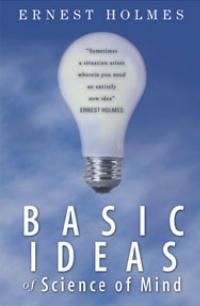
In developing the philosophy that became known as The Science of Mind, Ernest Holmes drew from many sources of wisdom. These included The Bible, the emerging New Thought Movement, Christian Science, psychology, physics (including quantum physics), Eastern mystical philosophies, and more.
What emerged from all of this study is a philosophy both rich and deep - one which can be used in practical ways to improve the experience of life and to connect you with your own transcendent self. It is in this multi-faceted usefulness that the teaching is so powerful and unique.
Another unique aspect of Religious Science is its lack of dogma. We say that we teach you HOW to think, not WHAT to think. There is no loyalty oath, no requirements that you believe any specific creed or dogma to be a part of a spiritual community. Since the teaching is based on the premise that your beliefs direct your experience, the goal is to have you come to understand this through self-realization. Any other means, such as a requirement that you believe a specific creed, would undermine this all-important self-realization process and limit spiritual freedom.
Right now, the Relgious Science organizations and independent churches and centers are struggling with the issue of name - what should we be called? Both Science of Mind and Religious Science are often confused with Scientology, or are simply not known by the general public. Part of the frustration comes from the experience of having new comers say, "Why this is what I've always believed! Where have you been hiding?"
Our future as a viable, relevant teaching is about more than our name, however. It is primarily about the degree to which our churches and centers - our spiritual communities - provide relevance and connection for people seeking the best of themselves and the best of life.
Viability and relevance are intertwined and the keys to our future. This means that we must do what Ernest Holmes did, not just in the early days of the teaching, but throughout his life - we must continue to study and add great wisdom to this teaching. Any reluctance to go beyond what Ernest discovered must be set aside to allow for the continued expression and expansion of the field of knowledge that The Science of Mind contains.
Modern scientific discovery is a rapidly expanding field of exploration that adds much to our understanding of ourselves and our world (universe). Greater availability of Eastern teachings than in Dr. Holmes' time brings great opportunities for greater understanding through the integration of eastern and western concepts and practices. And new ways of understanding such as Ken Wilbur's Integral Psychology, Spiral Dynamics, Conscious Evolution, etc., open new possibilities on an ongoing basis.
We must be courageous and dilligent in our pursuit of this new (or newly available) information - to incorporated what is of value and release what is not. In doing so, every Religious Scientist becomes an extension of the mind of Ernest Holmes - with an insatiable thirst for what is new and what is relevant.
Whatever we call ourselves, if we lose our sense of curiosity and our ability to be relevant, we will wither as a movement. I believe that it is through our openness to the new that our greatness emerges.
Love and Light,
RevLockard
1 comment:
You do write very well. Would you write out a treatment?
Thank you.
Nine Lives
Post a Comment